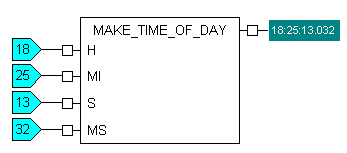| Function Name |
MAKE_TIME_OF_DAY |
|---|---|
|
Description |
Provides a time of day output that is made up from the components supplied via the inputs. |
|
Arguments |
The arguments are (from top to bottom): H {INT} H provides the hour. MI {INT} MI provides the minutes. S {INT} S provides the seconds. MS {INT} MS provides the milliseconds. For more information on the data types for the inputs and outputs, see Data Type Hierarchy. |
|
Returns |
Output {TIME_OF_DAY} |
Example:
Function Block Diagram - MAKE_TIME_OF_DAY:

The MAKE_TIME_OF_DAY function outputs a time of day value that is made up from the components supplied via its inputs (the hour is taken from the H input, minute from the MI input, seconds from the S input and the milliseconds from the MS input). On a live system, the inputs for a MAKE_TIME_OF_DAY function are often the results of a calculation, with the inputs being variable depending on the outputs of other functions etc.
ST Program - MAKE_TIME_OF_DAY:
The syntax for a MAKE_TIME_OF_DAY function in an ST Program is:
- Output := MAKE_TIME_OF_DAY (H, MI, S, MS);
Where Output, H, MI, S and MS are defined as variables earlier in the ST program.
Alternatively, you can use the following syntax:
- Output := MAKE_TIME_OF_DAY (H:= 18, MI:= 25, S:= 13, MS:= 32);
Where the numbers are the input values (in this case, they are the same numbers as used in the Function Block Diagram example above).